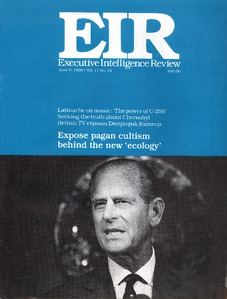Interviews
Dr. Richard Wilson
by Marjorie Mazel Hecht
A nuclear physicist from Harvard University discusses the scientific effort to trace the extent of the damage from the Chernobyl nuclear disaster.
Dr. Bertram Wolfe
by Marjorie Mazel Hecht
The vice president and general manager of Genera! Electric’s Nuclear Energy Operation lays out an agenda for the troubled U.S. nuclear industry.
Helga Zepp-LaRouche
by Mark Burdman
The founder of the Club of Life describes her 20-year battle against the malthusian genocide lobby.
Science & Technology
Chernobyl: Seeking Truth in the Political Fallout
by Marjorie Mazel Hecht
Reviews how the Soviets’ disregard for human life led to the Chernobyl disaster, and has continued covering up its aftermath four years later.
Documentation: Dr. Richard Wilson’s first-hand report on tracking down data on health effects in Ukraine.
‘Magic Will Not Solve Our Energy Problems’
by Marjorie Mazel Hecht
Dr. Bertram Wolfe says “nuclear is the superior technology” and maps out a program for its realization.
Departments
Report from Bonn
by Rainer Apel
A Flow of Capital Goods to the East.
Report from Rio
by Silvia Palacios
Battle over Nuclear Technology.
Andean Report
by Jaime Ramírez
Venezuela’s AD Party Disintegrating.
Panama Report
by Carlos Wesley
Did Bush Know U.S. Helped Arm Narcos?
Editorial
Summitry Flummery.
Economics
200% Tax Increase Won’t Help Budget Deficit
U.S. officials can’t even begin to estimate the size of the government’s “contingent liabilities.” All the Fed’s Greenspan could ay is, “The size of this hole is astronomical”—and he was only talking about the S&Ls.
U.S. Economic Collapse Is Behind ‘Arms Reduction’ Mania in Washington
by Leo Scanlon
Rockefeller, Kissinger, Bush Push ‘Open Door’ to Looting of Ibero-America
by Peter Rush
The Failed Economics of Thatcherism
by William Engdahl
Thatcher’s advocates say there’s been an “investment boom”—but investment in what? Part II in a series.
Currency Rates
Is Mexico To Be Assimilated into the Economy of the United States?
by Carlos Cota Meza
Menem Sells His Soul to the Devil
by Cynthia R. Rush
And Argentina’s economy to the IMF.
Agriculture
by Marcia Merry
Set-Aside Wrecks the Real Ecology.
Business Briefs
Feature
Prince Philip and the EPA Revive Paganism as ‘Ecology’
by Kathleen Klenetsky
Reports on the “Caring for Creation” conference in Washington, whose top-level participants decided that God didn’t really mean it, when he said that man should have dominion over nature.
We Must Win the Battle against the Eco-Fascists
by Mark Burdman
An interview with Helga Zepp-LaRouche.
Soviet Union Endorses New Eco-Fascist World Order
by Carol White
Moscow’s International Affairs has now officially joined the pagan line of Britain’s Prince Philip—in a campaign to destroy the industry of the West.
Global Forum vs. Human Civilization
by Mark Burdman
East met West at a Moscow conference to worship Gaia, the Earth Mother, and denounce the “technological wizardry” of modern science.
International
Soviet Union Faces Chaos Without Aid from the West
by Konstantin George
Some in Germany have an idea of how a Soviet catastrophe could be averted. Will the Bush Administration have enough sense not to sabotage their efforts? If not, we’re heading for a greater and greater danger of war.
Gorbachov Meets with the Trust in Canada
by Matt Guice
British Documentary Exposes OSI Fraud in Demjanjuk Trial
by Mark Burdman
EIR has been almost alone among the international media, in exposing the U.S. Justice Department’s phony “Nazi-hunter” operation against John Demjanjuk and others. Now at the eleventh hour, as the Israeli Supreme Court hears the appeal of his death sentence, some others are beginning to wake up.
‘Nazi hunters’ Set Their Sights on New Zealand
by Joseph Brewda
Presidential Elections in Colombia: Gaviria Gets Mandate for War on Drugs
by José Restrepo
International Intelligence
National
Gorbachov and Bush Reach the Nadir of Summitry
by William Jones
The Gorbymania which characterized the 1987 Reagan-Gorbachov summit has waned. This time, under the shadow of Lithuania and an economic crisis in both the U.S. and U.S.S.R., things don’t look as good for the superpower condominium.
‘LaRouche’ Trial in Roanoke Got Out Some of the Truth about the ADL
by Nancy Spannaus
A review of the recently concluded, landmark hearings in the Richard Welsh case.
Mira Boland: I Was a Vigilante for Project Democracy
by Herbert Quinde
The ADL, Pollard, and the Mr. X Committee
by Scott Thompson
Did a Thornburgh Dirty Deal Backfire?
by Steve Komm and Jeffrey Steinberg
Baltic Nations Void Washington Summit
by Leo Scanlon
‘Green’ Referenda a $900 Million Swindle
by H. Graham Lowry
The Power of 256
by Lyndon H. LaRouche, Jr.
Why must classical music be performed at a tuning that sets middle C at 256 Hz, contrary to the stratospheric tunings in vogue today? Lyndon LaRouche writes on the occasion of a concert in Washington on June 6, 1990 by violinist Norbert Brainin and pianist Günter Ludwig.
National News
Corrections
The copyrights were inadvertently omitted on the photos in the reviews for two books in our May 25 issue. The four photographs on p. 29 in the review June Four should be ©Ming Pao News; on p. 31 in the review of Beijing Spring, the left-hand photograph should be © Peter Turnley, and the cover photograph should be © David and Peter Turnley. In the June I issue, there were two major errors in the official court transcript of former National Security Council aide Richard Morris’s testimony which we quoted on p. 58, and which EIR has now corrected on the basis of the videotape of the testimony. The court stenographer erred in transcribing Morris’s report of the number of times he met with LaRouche and his associates as“six or seven times in the two years.” He actually said “six or seven times in each of the two years.” Also, Morris said that the U.S. government’s intelligence was “more extensive” than LaRouche’s, rather than, as the court reporter mistranscribed this, “more expensive.”



